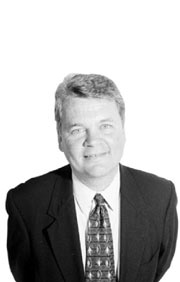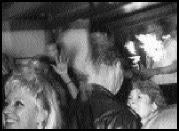WHAT HAS Greg Nickels done for Seattle lately?
Listen to him on the campaign trail, and you’ll hear a litany of small accomplishments: initiating annual restaurant inspections in King County; instituting a 24-hour graffiti hotline; getting violent games out of Seattle Center; the water taxi.
But it takes a probing conversation with his longtime, hard-core supporters—guys like former City Council member Tom Weeks—to get any solid answers on what the man has done in his 14 years on the King County Council that prepares him to be mayor of Seattle. What Weeks and others say may surprise you: Turns out Greg Nickels isn’t a nice guy after all.
Oh, sure, he’s sweet and trustworthy, but he isn’t one to shy away from taking tough stands—even when it wins him nothing but the vitriol of his fellow King County Council members. Says Larry Phillips, Nickels’ council colleague and frequent ally: “I don’t think you’d find anybody up here unwilling to trust Greg with a leadership position. He does stand his ground, but he’s not contentious when he does it. That’s why you get people in the Democratic party supporting him and people in the Republican party saying good things about him.”
His detractors—Nickels doesn’t really have any enemies—will tell you that Nickels can be mule headed even when it’s clear he’s wrong. With Greg, “there is no compromise,” says Maggi Fimia, a council Democrat who’s butted heads with Nickels many times over the years. “I kept seeing this pattern that he knew what the right thing to do was but he kept choosing not to get involved. I think he has many good qualities, except for the most important one, and that’s leadership. He can’t use any of the other ones if he doesn’t have that one.”
What few people disagree on is what Nickels has stood up for in his years in office. He’s been a key supporter of light rail since the 1980s; a backer of the Mariners even when the voters weren’t; and a staunch ally of public schools when the Families and Education levy was being debated in 1990.
But it’s a stand Nickels took back in 1990, when all eight of his council colleagues were lined up against him, that stands out in Weeks’ mind. “It’s one of those facts of politics that you never vote against public safety,” Weeks says. But that, in essence, is exactly what Nickels did, casting the only “no” vote on the new jail in Kent that all eight of his colleagues said was desperately needed. Nickels couldn’t support the jail, Weeks says, because he thought treatment and rehabilitation were better alternatives than simply “warehousing” people in prisons. “Greg started asking hard questions. He pushed an agenda of crime prevention and couldn’t get people to support it. He was out there all by himself,” Weeks recalls.
Others agree but see the implications differently. “The number one issue that’s going to be facing local governments in the next few years is funding criminal justice,” says Chris Vance, the state GOP chair who served on the council with Nickels from 1994 to 2001. “Greg Nickels is one of those folks that thinks putting cops on the streets and building jails is a bad idea. That’s your classic liberal ideology.”
But being a conscientious objector is one thing; leading the council boldly toward a goal is quite another. On that question, the record gets murkier. On one hand, everyone agrees that Nickels did an admirable job as budget chair on the Republican-dominated council—even Vance, who served as vice chair with Nickels from 1997 to 1998. “He and I worked together extremely well; every year we ended up passing the budget on time and balanced, usually with a large bipartisan vote,” Vance says. “He’s a great guy, and he’s great to work with. When you make a deal with Greg Nickels, when he shakes your hand and makes you a promise, you can count on it.”
Colleagues also admire Nickels’ performance as chair of the Seattle/King County health board during the late 1990s, a period when no topic was more controversial than the debate over whether doctors should have to report the names of HIV-positive patients to public health authorities. AIDS activists said “names reporting” would make people avoid getting tested for fear their HIV status could be used to violate their civil rights. Nickels crafted a prototypical “Seattle way” solution, convening a group of leaders from public health authorities, doctors, activists, and community leaders, and letting them hash out a compromise that worked for everyone.
Where Nickels’ detractors say he has failed, however, is not in leadership but in his refusal to back down from his positions, even when it has meant losing face, money, or his colleagues’ support. Gov. Gary Locke, who has endorsed Nickels’ opponent Mark Sidran, and Fimia point to a 1994 fight over whether to convert Metro’s bus fleet to natural gas. As Fimia tells it, Nickels, along with Larry Phillips, wanted to convert the entire fleet to natural gas even in the face of overwhelming evidence that “clean diesel” technology would reduce emissions of pollutants by 90 percent. The problem, Fimia says, is that Nickels just wouldn’t listen. “We spent a year debating it. First, Greg and Larry Phillips argued that [natural gas would] clean up the air. Well, no, you only get an additional 6 percent reduction, but you’re paying $60 to $90 million more.” Eventually, cost won out, and the council voted to cancel its $164 million bus contract, saving the county $96 million. Nickels, Fimia recalls, “voted no and he’s still mad about it.” Others, including Phillips, still think natural-gas buses were the way to go. “There were some get-even politics involved in that one,” Phillips claims.
No less contentious was the debate over whether to issue county bonds to help pay for the Mariners’ new stadium in 1995, a time when the M’s had few fans in Seattle or anywhere. A bond issue had failed at the polls by a narrow margin, and Mariners executives were threatening to put the team up for sale if the county and state didn’t commit to building a new stadium by the end of October. Colleagues recall that Nickels took a leading role in keeping the Mariners in Seattle, for better or worse. “When Greg took a position in favor of keeping [the Mariners] here, no one liked them,” Weeks says. “Greg said, ‘I don’t care; it’s good for Seattle in the long run.'” Larry Gossett, a frequent Nickels ally who voted against the stadium, says Nickels’ firm stand on keeping the Mariners in Seattle just “reinforces the fact that he’s a principled person. If it’s something he believes in, he’ll stick with it.”
Exactly, Nickels’ detractors say. Critics of the stadium deal said the county was paying more than its share of the stadium’s cost, that the county had no real oversight over how much it would contribute or what the stadium would look like, and that the deal sent a message that professional sports teams could strong-arm the government into giving them what they wanted. To Nickels, they say, it didn’t matter. “There were numerous alternatives. We did not have to fund 80 to 90 percent of the stadium. We could have offered to pay a lower percentage like other cities have done, but Greg decided not to do that,” Fimia says. “He was not a tough negotiator. He hasn’t shown that he will make the decisions that benefit the regular folks out there.”
So, which Nickels will lead Seattle— the nice, squishy liberal with an unfortunate tendency to bow under political pressure, or the tough-guy, take-no- prisoners man of principle who won’t back down when he thinks he’s right? If Nickels wins, don’t count on him to choose one or the other; by all indications, all these characteristics exist, more or less peacefully, in the same person.







